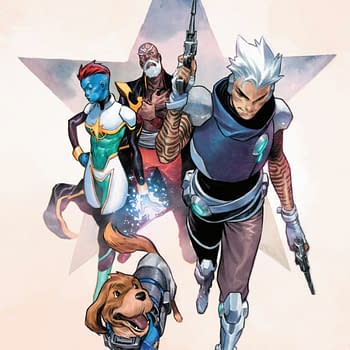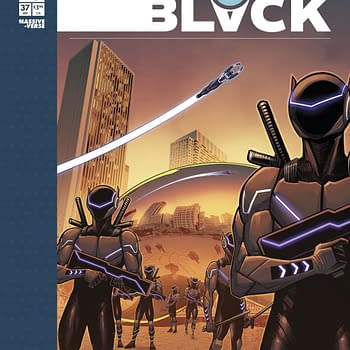Posted in: Look! It Moves! by Adi Tantimedh, Recent Updates | Tagged:
Look! It Moves! by Adi Tantimedh#32: That Was The Doctor That Was
And lo, DOCTOR WHO ended the decade with a death and rebirth as both showrunner Russell T. Davies and star David Tennant (as well as executive producer Julie Gardner) decided to leave the show, ending a five-year run that turned the show into a nerdy embarrassment into the show that not only saved the BBC from obscurity about also relaunched a new Science Fiction trend in British telly.
Looking at Davies' entire run on the show, it's interesting to see how he wove everything together for the end so that it's a coherent single story, a novel for television as you will. This wasn't always his intention, as the first series in 2005 with Christopher Ecclestone was considered a huge gamble at a time when no British TV broadcast was willing to greenlight a Science Fiction show since many executives were utterly convinced there was no market demand, despite the continued success of US imports like BUFFY and THE X-FILES and the popularity of Hollywood Science Fiction blockbusters. (I could go on for days about the arrogant solipsism of TV executives – and book and comics editors, for that matter – who are convinced no one could possibly like something just because they didn't even when there's plenty of quantifiable evidence to the contrary. They have an arrogance even the most egomanical of Hollywood types lack.) British TV execs were generally Hampstead and West London snobby types who looked down on genre despite it being the bread-and-butter of commercial drama, but by 2005, a new generation of producers and executives who were unashamed fans of Science Fiction and Fantasy were beginning to gain prominence in the industry, and the revival of DOCTOR WHO was the first shot of their arrival. BBC executive Jane Tranter fought to get the show commissioned because she loved it enough to know that it could be popular once again if given a chance. There were people in the industry who expected it to fail and a fair number who wanted it to fair. Then there were are those of us who believed the only way the show could fail would be that it was really, really awful, but it wasn't, and it didn't. Instead, it revived the family drama and opened the flood gates to all sorts of commissions. Without the new DOCTOR WHO, there would have been no PRIMEVAL, DEMONS, MISFITS, no DEAD SET, no revamp of SURVIVORS or DAY OF THE TRIFFIDS. It proved that Science Fiction wasn't a niche, nerdy embarrassment. There's no validation like commercial and ratings success, and you don't get better than WHO now generates at least £100 million of annual income for the BBC.
What I find interesting about Davies' revival of WHO is how he kept everything that worked in the old show and updated it to the current specs of British drama. Back in the Sixties and Seventies, genre scriptwriting was entirely plot-driven. Character and emotion were generally an afterthought, let alone emphasis on theme, though shows would not function without dominant themes or compelling characters. The show was never about originality (though it hit upon it from time to time in its history) but the speed with which plot ideas are thrown in to power the story along. It shamelessly lifted story ideas from gothic literature and movies all the time. What Davies did was bring a new emphasis on emotions, which is emblematic of current British drama. Instead of relying on techspeak gobbledegook that the old show used all the time, Davies relied instead on emotional logic rather than plot logic. He knows most of the audience will forgive anything if the emotions ring true, and he's unashamed of sentiment. In many ways, his run represents and updates the current state of British television drama in its embrace of unabashed emotional display and sentimentality even at the risk of mawkishness. A good cry is good catharsis.
That first series with Christopher Ecclestone was made with no knowledge that it would be renewed at all, so Davies threw everything that he thought was cool about Doctor Who into it, slicker and pacier than the old show ever was. It was pretty much a concise compendium of WHO. When the show was successful and continued, Davies then got to expand and slowly acknowledge its old continuity without it overwhelming the show and making it incomprehensible, so references to the old show were doled out as background and easter eggs for older fans. As with most TV series, it's hard to maintain the sense of freshness that a first season offers, and WHO had its moments of repetition and sameness in subsequent seasons, but the irony is that repetition and sameness are precisely the comfort-food elements that viewers stick to a show for. To his credit, Davies did everything he could think of to keep the show from getting stale. It's often by the fourth season that a show usually starts to fall flat, when the writers start to run out of fresh ideas. Davies has managed to avoid this by burrowing deep into the themes he had set up in the first series – the moral dilemmas of intervention, the travails of a lonely god, the guilt and trauma of the survivor – and continued to spin them out with escalating stakes. What he ended up with by his finale was a sense of completion and closure that felt like he'd said everything he wanted to say with The Doctor and the arc he devised for him. Davies has managed to turn his entire run into a single coherent arc that kept true to its themes.
What Davies has done with WHO is devise it with an aim to encourage and reward fannish devotion. As a fan himself, he understands what fans wants from a story intimately. He also set out to create new fans among women and kids, since he knew that it was a hermetic fixation on its own continuity that caused the old version of the show to became stagnant and lose viewers. Thus he ignored the moans and whines from hardcore fans who complained that the new show didn't conform to their own platonic ideals of what the show should be and concentrated on creating stories accessible to a new audience, specifically children. And with that brief, he used myths happily cobbled together from movies to comics to the Bible in the same spirit that Doctor Who plots have always been cobbled together from other stories. He's taken the ending of Series Two from the ending of Philip Pullman's HIS DARK MATERIALS trilogy. The theme and feel of the last fifteen minutes of THE WATERS OF MARS replicate MACBETH. THE END OF TIME PART 2 is reminiscent of HAMLET, and Tennent's performance references his own run in the RSC production earlier in the year. And Davies has imbued The Doctor with Christ symbols throughout his run, and the notion of the regeneration could be given a religious reading if you cared to. For an atheist, Davies can be a very Anglican one. And the coda where The Doctor visits his companions for one last time like an dying angel is not only full of obvious symbolism, but also reminiscent of the final pages of Jaime Hernandez' THE DEATH OF SPEEDY ORTIZ. I know Davies is a comics reader, and I'd love to know if he read LOVE AND ROCKETS. I don't remember any other movie or TV show that's used the device of the dying hero appearing to his friends one last time.
I don't think all the talk of how wonderful The Doctor is throughout the last five years is merely self-congratulation or luvvie-ness. After the dire and dour dramas of the 1990s, The Doctor is a symbol for imagination and creativity, his return to British television is a return of the acknowledgement of the need for imagination in popular drama. That's why he's wonderful. And that's why we forgive the scripts' faults when they're weak, the cuteness that goes a bit too over-the-top, the plot holes, the occasionally creaky sets, the silly aliens, and keep watching.
Wheezing mechanically at lookitmoves@gmail.com
© Adisakdi Tantimedh












